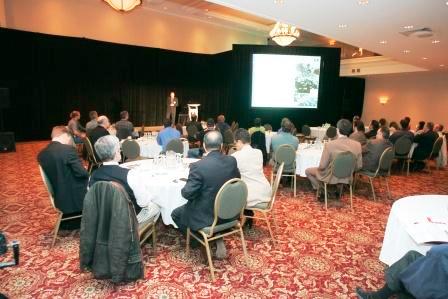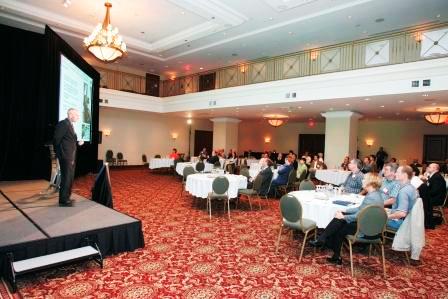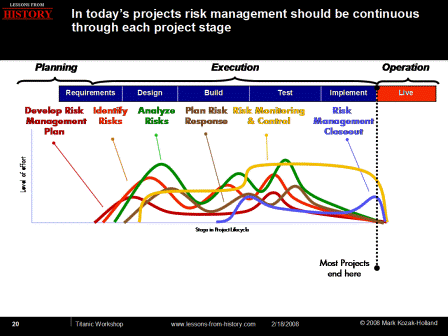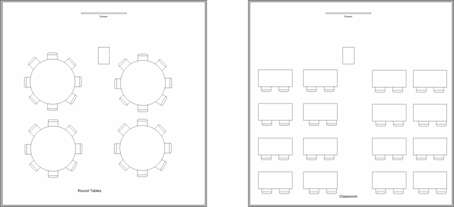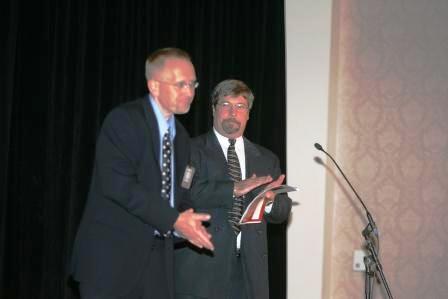LFH Overview
LFH Workshops
Managing Projects with Meddling Stakeholders
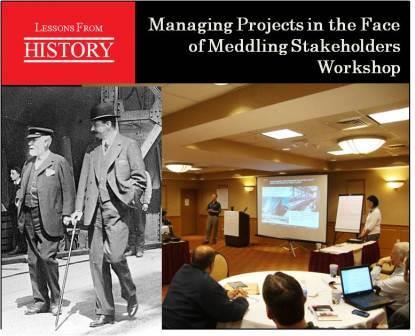 Lessons from the project that built, launched, and sunk Titanic. Read more
Lessons from the project that built, launched, and sunk Titanic. Read moreManaging Projects in a Hostile Environment
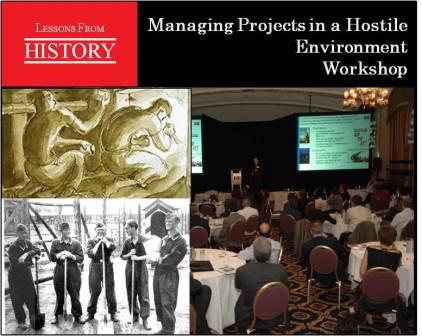 How to set up a project in a hostile environment with limited resources. Read more
How to set up a project in a hostile environment with limited resources. Read moreManaging Complexity in Projects
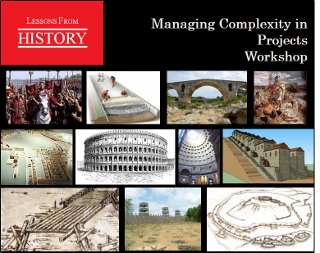 How to manage complexity in different project situations.Read more
How to manage complexity in different project situations.Read moreManaging Risk in Projects
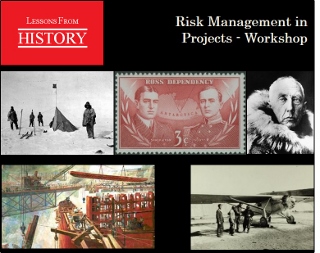 How to manage risk in different project situations.Read more
How to manage risk in different project situations.Read more(Fostering) Innovation in Projects
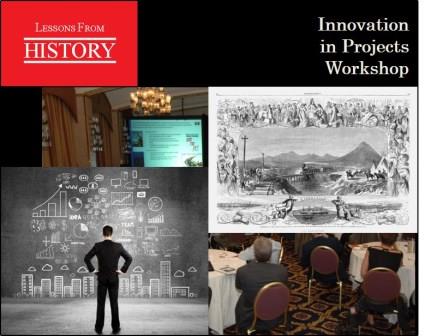 How to initiate and foster innovation in a project. Read more
How to initiate and foster innovation in a project. Read moreExamining Truly Inspiring Projects
 Exploring the most influential projects of all time & taking lessons from these. Read more
Exploring the most influential projects of all time & taking lessons from these. Read moreManaging Impossible Projects
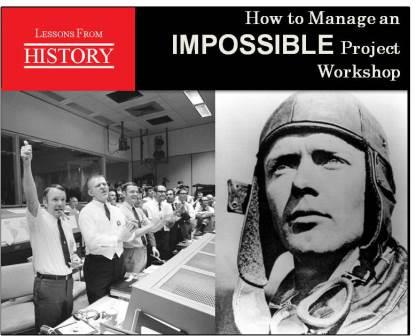 How to manage a seemingly impossible project.Read more
How to manage a seemingly impossible project.Read moreProgram and Project Governance
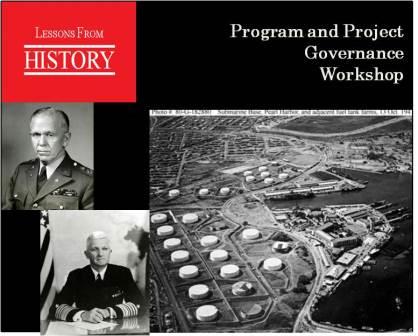 How to install a governance for conflicting and overlapping mandates. Read more
How to install a governance for conflicting and overlapping mandates. Read moreKnowledge Transfer & Sharing in Projects
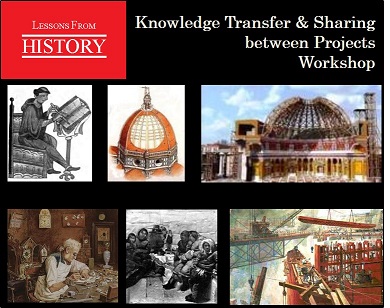 How to encourage Knowledge Transfer & Sharing between projects. Read more
How to encourage Knowledge Transfer & Sharing between projects. Read moreEntrepreneurial Thinking & Client Mgt
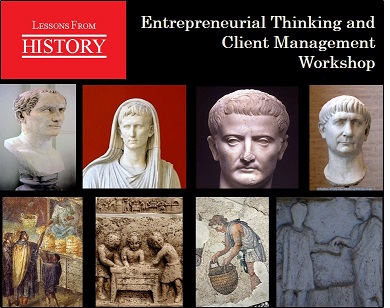 Entrepreneurial Thinking and Client Management; taking lessons. Read more
Entrepreneurial Thinking and Client Management; taking lessons. Read moreRewarding Team Members
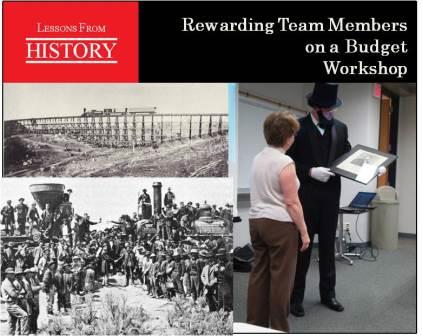 The issues in keeping morale high when you have a little or no budget.Read more
The issues in keeping morale high when you have a little or no budget.Read moreManaging Projects in a Sea of Change
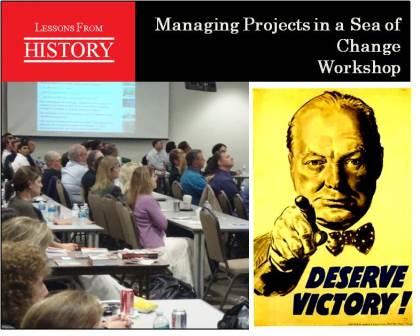 How to plan and execute projects in a climate of rapid changes.Read more
How to plan and execute projects in a climate of rapid changes.Read more
About the Lessons from History WorkshopsLFH workshops focus on critical problems we face in business and projects today but through a business lens examining relevant historical case studies. As a result, the LFH workshops provide a deeper understanding of the problems and highlights how solutions can be found. They are described below. Audience for WorkshopsLFH workshops provide for both management and project management and are typically suited to managers, project managers, business analysts, IT and business professionals, and decision makers. They have been widely delivered to PMI chapters, organizations, corporations, and at conferences (see testimonials). Available WorkshopsAll LFH workshops are customizable to an organization's needs. We will work with you in modifying a workshop to meet your particular environment. |
Managing Projects in the Face of Meddling StakeholdersThe workshop explores the complex process of gathering requirements, and the difficulties in managing principal stakeholders through the requirements process, where they can unwittingly compromise the project. The workshop juxtaposes the Titanic case study and modern projects to show how compromises were made to this requirements process by naval architects. They were pursuing the sponsor's project mantra “to create the ultimate passenger (first class) experience.” This led to serious flaws in a supposedly "perfect ship," considered so safe that it did not even need a full complement of lifeboats. The workshop is targeted at organizations with Project Management Offices, and a Project Management Practice, looking to provide best practices to these bodies. The workshop highlights the balance that needs to be achieved between the business and the technical sides of a project. Exercises include assessing the risks through each of the project stages. Based on articles published in Gantthead Audience: Project managers, IT and general business professionals |
|
Managing Projects in a Hostile EnvironmentThe workshop explores the difficulties encountered in the initiation and execution of a project in a hostile environment, where everyone is trying to close your project down. In today’s highly competitive world high project failure rates have brought projects under more scrutiny and attention from executives and senior management. No project is completely safe from being challenged or closed down. The workshop juxtaposes the Great Escape case study and modern projects by looking at common problems like the challenges of initiating a project without sponsors, and getting it enough support to get it through early the stage gates. It also looks at how the project team was able to organize itself and mitigate the risks it faced. Ideas and solutions were tested continuously and refined in a determined atmosphere where everything was thought possible. The workshop is targeted at organizations with Project Management Offices, and a Project Management Practice, looking to provide best practices to these bodies. Exercises focus on the project charter and all ten PMBOK Knowledge Areas. Audience: Project managers and general business professionals |
|
Managing Complexity in ProjectsThe workshop examines project complexity and the challenges around it. Complexity can adversely impact your a project in different ways, sometimes leading to project failure so strategies are needed to deal with complexity and decomplexify projects. The workshop examines through a set of project case studies the project complexity spectrum from simple to complex, and a range of different scenarios which cover both best and worst case projects. Audience: Project managers, project leaders, team leaders and general business professionals |
|
Managing Risk in ProjectsThe workshop examines why risk management is becoming increasingly more important within projects as their complexity increases and how risk management can play a critical role in the success of a project by managing uncertainties, ambiguities, and unexpected changes. The workshop examines through a set of project case studies the use of risk management in a range of different scenarios which cover both best case projects (that used risk foresight) and worst case projects (that responded to a failing situation or a crisis). Audience: Project managers, project leaders, team leaders and general business professionals |
|
Innovation in ProjectsThe workshop examines what innovation is and why often it does not exist in a project at any level. It also examines not only the different types of innovation but how a project can be set up to act as a catalyst for innovation. Innovation is not always associated with project management but projects are one-time opportunities and unique endeavours. Sometimes they may be the only time for organizations to innovate as the opportunity may simply not exist after the project. This workshop is unique as it examines how to take a proactive approach to incorporating innovation so it is part of projects. Audience: Project managers, project leaders, team leaders and general business professionals |
|
Truly Inspiring ProjectsThe workshop explores the ten most influential projects of all time, and how these highly innovative projects overcame perceived insurmountable problems. The analysis is done through the modern lens of the PMBoK nine knowledge areas and provides valuable insights into how these projects were planned and executed, and in the innovative way they managed new emerging technologies to create truly inspiring deliverables. As a result, they inspired subsequent projects that would follow. The workshop examines common emergent patterns across the projects, best practices and techniques, and then draws out practical project lessons to apply to today’s projects. These projects were selected because of their impact on projects and project management. The workshop is taken from the History of Project Management Audience: Project managers, project leaders, team leaders and general business professionals |
|
Impossible ProjectsThis workshop explores some of the most famous “impossible projects” in human history — things that nobody would have thought possible until they were actually accomplished. Following in the footsteps of great project managers such as Julius Caesar, Charles Lindbergh, Robert Moses, and others, you’ll get the inside scoop on how the most brilliant minds in history solved the most intractable problems in the history of project management. Audience: Project managers and general business professionals |
|
Program and Project GovernanceThis workshop is based on the attack on Pearl Harbor as a study in governance. There were two large bureaucratic organizations (The U.S. Army and Navy) managing the most complex technology of their day. These two groups were given conflicting and overlapping mandates in Hawaii, with a shared goal and badly broken lines of communication. Audience: PMO leaders, program and project managers, project team members, managers and general business professionals. |
|
Knowledge Transfer & Sharing between ProjectsThe ability to diffuse knowledge across and within organizations is today recognized as a major strategic capability for gaining competitive advantage. The workshop examines what knowledge management is in the context of projects, how it contributes to the attainment of value from projects and how it covers knowledge transfer and knowledge sharing between projects. It also examines why it is challenge in different types organization, specifically in those that are project based. Audience: Project managers, project leaders, team leaders and general business professionals |
|
Entrepreneurial Thinking Applied to ProjectsEntrepreneurial thinking is normally associated with product creation and product innovation but this course looks to assist the workshop attendee in the application of entrepreneurial thinking to the discipline of Client Management. Client Management is the comprehensive set of strategies, processes and techniques used to manage and improve all elements of the client relationship. By examining the intersection of entrepreneurial thinking and the client relationship the project manager, process manager or business manager attending this workshop will have the unique opportunity to learn the importance of developing and enhancing the following six entrepreneurial attributes: vision, flexibility, confidence, tenacity, opportunism and passion. To accomplish this goal, the workshop offers the attendee the opportunity to study five ancient but very successful entrepreneurs, entrepreneurs that have rarely, if ever been presented as project management case studies. Four of these entrepreneurs will be analyzed for the entrepreneurial thinking attributes they displayed in their client management efforts and a fifth will be studied as a counter example to the others. Audience: Project managers, project leaders, team leaders and general business professionals |
|
Rewarding Employees and Team Members without Breaking the BankThe workshop explores the issues in keeping morale high when you have a little or no budget. This is a problem which managers have had since the earliest days of projects like the construction of the Giza Pyramid and the Roman Colosseum. Managers have had to create solutions and different reward systems to motivate their teams to deliver projects. The workshop examines different historical case studies and draws important lessons and strategies from these. For example, the U.S. Transcontinental Railroad Construction Project which looked doomed to fail until the right reward systems were then put in place. In another example, the French Panama Canal Project (1882-1888) implemented the wrong reward system that bankrupted the project. In these economically-challenged times, the use of rewards might seem extravagant — but building team morale is even more important in tough times! Nevertheless, even the best reward ideas can fall flat if they aren't suitable to the person, the organization, the situation or the magnitude of the accomplishment. Audience: Project managers, project leaders, team leaders and general business professionals |
|
Managing Projects in a Sea of ChangeThe workshop explores the challenges encountered in the initiation and execution of a project in an environment of continuous change. Change can adversely impact your organization at different levels. A chaotic environment is difficult to predict and to run projects in. The workshop juxtaposes the Churchill case study and modern projects and and provides an insight in how to deal with volatility and change, and keep an organization on track with its projects. The workshop is targeted at organizations with Project Management Offices, and a Project Management Practice, looking to provide best practices to these bodies. The workshop highlights how the concepts of agile project management were used to find a resolution to seemingly unsolvable problems in a very short time frame. Exercises focus on assessing the situation and decision making. Audience: Project managers and general business professionals |
|
What Does a Lessons from History Series Workshops Look Like?

